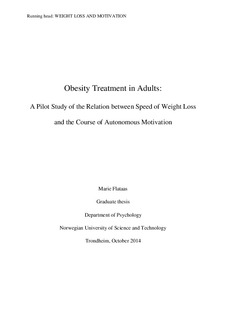| dc.description.abstract | Motivation is an important factor for weight loss and weight loss maintenance, but knowledge is needed on different weight loss interventions and how they affect motivation. Because it is assumed that a sustained motivation for dieting makes the patient more able to comply with the treatment and thus succeed in losing weight, identifying how different interventions affect motivation is of great importance. The current RCT therefore aimed to explore the course of motivation for dieting in two treatment groups who lost 10 % of their body weight with different speed; either during a four week very low calorie diet (VLCD) or a low calorie diet (LCD), lasting eight weeks. The participants (N=35, of which 26 were women) completed the Treatment Self-Regulation Questionnaire (TSRQ) at baseline (T1) and after four (T2) and eight weeks (T3), in addition to several bodily measures, as weight and height. The results showed that both groups’ motivation was relatively stable during the treatment period, and there was no difference in the course of motivation between the two interventions. In conclusion, motivation was not differentially affected by the speed of weight loss. | nb_NO |
